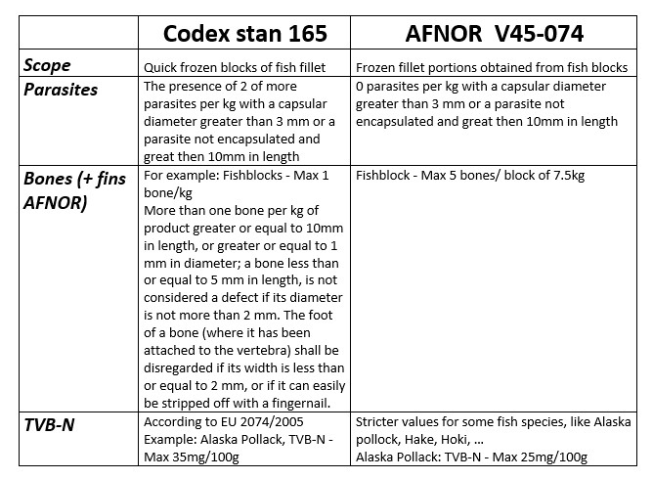As well as having an obligation to comply with national regulations, responsible seafood producers, such as Pittman, can also cater to customers’ preferences regarding seafood that meets the requirements of a range of intragovernmental guidelines – including the Codex Alimentarius and AFNOR International.
The Codex Alimentarius
Established by the UN’s Food and Agriculture Organization (FAO) and the World Health Authority (WHO) in 1963, the Codex Alimentarius is a collection of internationally recognised standards, codes of practice, guidelines and recommendations relating to food, food production, food labelling and food safety.
It is supervised by the Codex Alimentarius Commission (CAC), an intergovernmental organisation which is made up of delegates from each of the member states of the FAO and the WHO. Its main goals are to protect the health of consumers, to facilitate international trade, and ensure fair practices in the international food trade.
The Codex includes a range of recommendations for members. Although these are voluntary, they often underpin national legislation relating to food and food safety guidelines. The Codex includes standards for all principal foods – whether processed, semi-processed or raw, and includes provisions relating to food hygiene, food additives, residues of pesticides and veterinary drugs, contaminants, labelling and presentation, methods of analysis and sampling, and import and export inspection and certification.
Within the Codex are several documents that relate to specific food sectors and the one most relevant to seafood is the Code of Practice for Fish and Fishery Products, which – as it explains – “applies to the growing, harvesting, handling, production, processing, storage, transportation and retail of fish, shellfish and aquatic invertebrates and products thereof from marine and freshwater sources that are intended for human consumption”.

Developed by the Codex Committee on Fish and Fishery Products, it offers general advice on the production, storage and handling of fish and fishery products onboard fishing vessels and on shore. It also deals with the distribution and retail display of fish and fishery products.
Furthermore, it aims to provide user-friendly background information and guidance on the development of fish and shellfish process management systems, so that users can incorporate Good Manufacturing Practice (GMP) as well as apply Hazard Analysis and Critical Control Point (HACCP) in countries where such measures have not yet been developed. In addition, it can be used for training fishermen and employees in the fish and shellfish processing industries.
AFNOR International
While not as well-known or as widely subscribed to as the Codex, the Association Française de Normalisation (AFNOR), has been championing the adoption of voluntary standards for even longer.
Formed in Paris in 1926, the French Standardization Association is now a member body of the International Organization for Standardization (ISO) and has international reach, developing its international standardisation activities, information provision, certification and training through a network of key partners. New standards are regularly drawn up – and old ones updated – by AFNOR to reflect the constant evolution of sectors such as food and the prioritisation of different concerns around it.
AFNOR’s partner that’s most relevant to seafood is Actia, which unites the activities of food technology institutes (ITAIs) and partners, who provide daily support for companies, especially SMEs.
With over 80 sites in France, Actia Centres intervene in all sectors of the food industry and in the promotion of agricultural products for other uses – such as biotechnology, fine chemistry and pharmacy.
Pittman’s dealings with the Codex and AFNOR
Pittman has a wide range of customers and many of them stipulate that AFNOR and/or Codex parameters must be met.
Using the example of a fish fillet, the type of parameters assessed by both sets of standards include bone content, the presence of parasites, moisture levels, odour and flavour. Meanwhile, AFNOR assesses a number of additional criteria – including the condition of the skin and scales and the colour and texture of the product.
The Codex is widely accepted within the fishing industry and it is also supported by Pitman’s suppliers and producers. However, some buyers – often those from France – have a preference for their seafood to meet AFNOR’s stricter and more extensive criteria and, in many cases, that is also possible for Pittman to arrange.












Comments